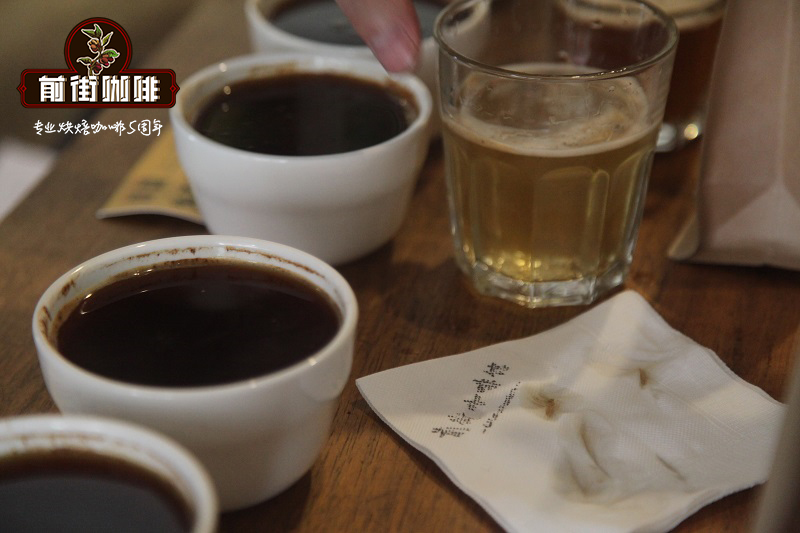Coffee is not only bitter, coffee sweet source, coffee sweet and roast related

Professional coffee knowledge exchange more coffee bean information please follow the coffee workshop (Wechat official account cafe_style)
"the coffee must be bitter!" Such a verdict. It still pops up in a lot of people's minds. Then I'll tell you today that coffee is also sweet! Bitter coffee? It's a thing of the past. Now boutique coffee and consumers want to taste the natural sweetness (sweetness) of coffee in coffee, not because of the addition of sugar or honey, but from the coffee itself.
Why is coffee naturally sweet? Or how should we bring out the natural sweetness of coffee in roasting and brewing?
Many people refer to sweetness when describing the flavor of coffee, and it is important to understand what happens during baking to produce these natural sugars.
Coffee beans contain a certain degree of monosaccharides, although not all sugars are sweet, but these monosaccharides are usually sweet and easily react under the catalysis of coffee roasting temperature. Once most of the moisture in coffee beans evaporates, sugars begin to react differently to heat, some of which are caramelized, causing caramel-like tonality in some coffee beans. In particular, these caramelized sugars become less sweet and eventually become one of the sources of bitterness; other sugars interact with proteins in coffee beans for a so-called Maillard reaction, including the browning of meat in the oven and discoloration when baking cocoa or coffee beans.
What is sweetness?
Sweetness is generally associated with the high sugar content of the food itself, which is most commonly found in carbohydrates, which contain sucrose (usually granulated sugar) and lactose (milk).
In the Flavor Bible, Page and Dornenburg write: "sweetness provides the greatest stimulation to the taste buds of the tongue (in contrast to salty, sour and bitter). However, through the balance and roundness, we can feel the delicacy brought by the subtle sweetness of the food.
In other words, sweetness is not only important to us sweet lovers, it is also an element of balancing taste.
Why is there no natural sweetness in some coffee
There is a certain sugar / sweetness in the berries of high-quality Arabica coffee. Because defects in planting, harvesting, and handling (such as the immaturity of picked coffee berries, etc.) can reduce the sweetness of coffee.
Raw bean stage: there is no sweet taste.
Dehydration stage: there is no reaction when the temperature in the first half is insufficient, and the temperature in the second half just reaches the starting point of the pyrolysis reaction, 160 degrees Celsius. At this time, there is "transsaccharification" and the sweetness begins to develop.
Enter the explosion stage: once most of the water evaporates, the sugars begin to react with the heat, and the sweetness continues to increase, but the beans are not yet ripe, so the sweetness is masked by astringency.
The stage from the beginning of the explosion to the end of the explosion: the sweetness continues to increase, the beans are nearly fully ripe at the end of the explosion, the internal astringent taste decreases, the sour taste increases, and the sweetness begins to emerge.
The end of the first explosion to the initial stage of the second explosion: at this time still transsaccharification, and entered the peak, in addition, caramelization also began slowly. "turn saccharification" is an important step to increase the intensity of sweet, "caramelization" will reduce the intensity of sweet, and then bring out some slightly coking aroma, increase the sense of hierarchy.
From the beginning of the second explosion to the intensive stage of the second explosion: the transsaccharification enters the end, and the caramelization enters the peak, at which time the sweetness intensity no longer increases, but becomes weaker and weaker. Note: this refers to the sweetness intensity, not sweetness. It just won't be sweeter any more. It has reached saturation and gradually carbonized.
From the dense stage of the second explosion to the end of the second explosion: is it still sweet at this stage? Yes, it's just that the transsaccharification disappears and turns into less sweet caramel. at this time, there is no sour taste, leaving only bitterness and caramel sweetness, so some people say that if the beans are baked successfully and cooked properly, the beans taste like high concentrations of dark chocolate milk and have a long-lasting sweet taste.
.
END
For more professional coffee exchanges, please scan the code and follow Wechat: qiannjie

Please indicate the source of the reprint.
Important Notice :
前街咖啡 FrontStreet Coffee has moved to new addredd:
FrontStreet Coffee Address: 315,Donghua East Road,GuangZhou
Tel:020 38364473
- Prev

Attention should be paid to the reduction of caffeine caused by cold water extraction for a long time in the production of ice drop coffee.
Professional coffee knowledge exchange more coffee bean information please pay attention to the coffee workshop (Wechat official account cafe_style) at the beginning to adjust the flow rate of ice droplets, about 60 drops per minute, that is, the speed of one drop per second, early observation, at any time to adjust, the later flow rate can be adjusted slowly, to make a 220ml liquid is about 6-8 hours, I usually
- Next

The coffee is sour and bitter. Where does the sour coffee come from? how to brew it so that it won't be very sour?
Professional coffee knowledge exchange more coffee bean information please follow the coffee workshop (Wechat official account cafe_style) pleasant sour coffee most people mistakenly think that coffee is not fresh will have sour taste, in fact, coffee itself is sour drink, whether coffee is sour or not depends on the variety and baking degree of beans, the longer the baking time, the higher the degree of caramelization, the acidic substances are
Related
- Beginners will see the "Coffee pull flower" guide!
- What is the difference between ice blog purified milk and ordinary milk coffee?
- Why is the Philippines the largest producer of crops in Liberia?
- For coffee extraction, should the fine powder be retained?
- How does extracted espresso fill pressed powder? How much strength does it take to press the powder?
- How to make jasmine cold extract coffee? Is the jasmine + latte good?
- Will this little toy really make the coffee taste better? How does Lily Drip affect coffee extraction?
- Will the action of slapping the filter cup also affect coffee extraction?
- What's the difference between powder-to-water ratio and powder-to-liquid ratio?
- What is the Ethiopian local species? What does it have to do with Heirloom native species?

